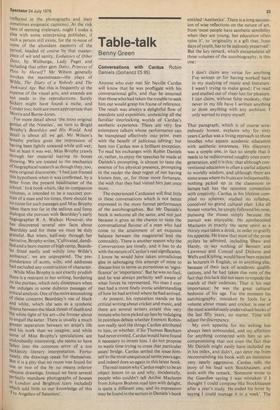Table-talk
Benny Green
Conversations with Cardus Robin Daniels (Gollancz £5.95) Anyone who ever met Sir Neville Cardus will know that he was profligate with his conversational gifts, and that he assumed that those who had taken the trouble to seek him out would grasp his frame of reference. The result was always a delightful flow of anecdote and exposition, embracing all the familiar interlocking worlds of Cardus's aesthetic experience. There are very few extempore talkers whose performance can be transposed effectively into print, even with the benefit of judicious editing; but here too Cardus was a brilliant exception. To read his exchanges with Robin Daniels or, rather, to enjoy the speeches he made at Daniels's prompting, is almost to taste the essence of his physical presence, prompting in the reader the deep regret of not having known him, or, for those more fortunate, the wish that they had visited him just once more.
The experienced Cardusian will find little in these conversations which is not better expressed in the more formal performance of the autobiographies. But Mr Daniels's book is welcome all the same, and not just because it gives us the chance to taste the conversational flavour of a man who had come to the attainment of an exquisite balance between the magisterial and the comradely. There is another reason why the Conversations are timely, and it has to do with the nature of Cardus's real significance. I know he would have taken unmalicious glee in sabotaging this attempt of mine to discuss him in terms as portentous as 'significance' or 'importance'. But he was no fool, and he was always perfectly well aware of what forces he represented. No man I ever met had a more finely ironic understanding of how he had arrived where he-had arrived.
At present, his reputation stands on his critical writing about cricket and music, and there are several writers extant this very minute who have picked up fees by indulging in pointless debate whether Emmott Robinson really said the things Cardus attributed to him, or whether, if Sir Thomas Beecham had never existed, Cardus would have found it necessary to invent him. I do not propose to waste time trying to cross that particular asses' bridge. Cardus settled the issue himself in the most unequivocal terms years ago, and indeed does so again in this latest book.
The real reason why Cardus ought to be an object lesson to us and why, incidentally, people who couldn't tell Archie Maclaren from Johann Brahms read him with delight, is quite a different one, and its expression may be found in the section in Daniels's book entitled 'Aesthetics'. There is a long succession of wise reflections on the nature of art, from 'most people have aesthetic sensibility when they are young, but education often ruins it', to 'originality is a gift that, from days of youth, has to be jealously preserved'. But the key remark, which encapsulates all three volumes of the autobiography, is this one: I don't claim any virtue for anything I've written or for having worked hard in my studying of music and literature. I wasn't trying to make good; I've read and studied out of sheer lust for pleasure. I can claim, without false modesty, that never in my life have I written anything or done anything with any ambition. I only wanted to enjoy myself.
That paragraph, which is of course scrupulously honest, explains why for sixty years Cardus was a living reproach to those noodles who equate academic education with aesthetic awareness. His discovery was a simple one, in fact so simple that it needs to be rediscovered roughly once every generation, and it is this: that although conventional education is often a useful adjunct to worldly wisdom, and although there are some areas where its fruits are indispensable, nothing picked up in the classroom or lecture hall has the remotest connection with creativity. Cardus in his lifetime compiled no schemes, studied no syllabus, conceived no grand cultural plan. Like all honest votaries, he simply followed his nose, pursuing the muses simply because the pursuit was enjoyable. He apotheosised Maclaren in exactly the same spirit as a thirsty man takes a drink, in order to gratify his appetite. He knew that most of the prose ,stylists he admired, including Shaw and Hardy, to say nothing of Bennett and Lawrence and Conrad and Dickens and Wells and Kipling, would have been rejected as lecturers in English, or in anything else, because of their lack of academic qualifications, and he had taken due note of the fact that this lack did not seem to impede the march of their cadences. That is his real importance: he was the great cultural hedonist of his age. For the moment his autobiography, mistaken by fools for a volume about music and cricket, is one of the most scandalously undervalued books of the last fifty years; no matter. Time will adjust the discrepancy.
My own appetite for his writing has always been unbounded, and my affection for anything connected with him so uncompromising that not even the fact that Mr Daniels might easily have included me in his index, and didn't, can deter me from recommending his book with an insistence very nearly aggressive. Cardus tells the story of his feud with Stockhausen, and ends with the remark, 'Someone wrote to the Guardian saying I was mistaken if I thought I could compose like Stockhausen after a year's study. He ended his letter by saying I could manage it in a week'. The


































 Previous page
Previous page